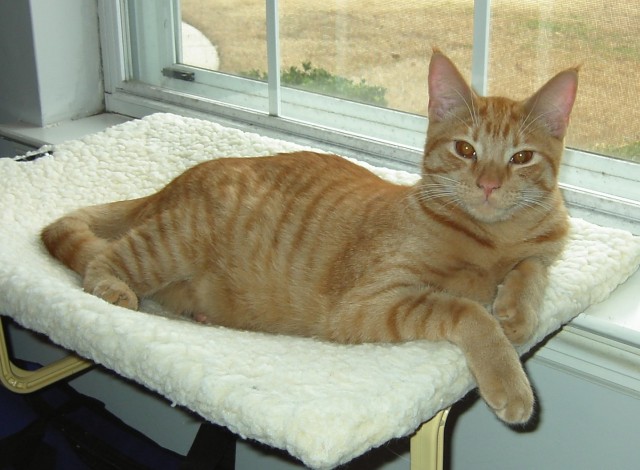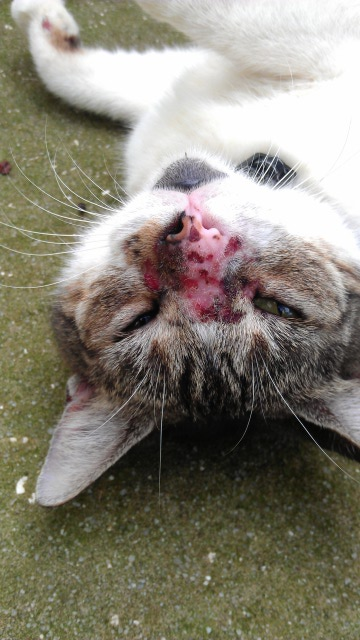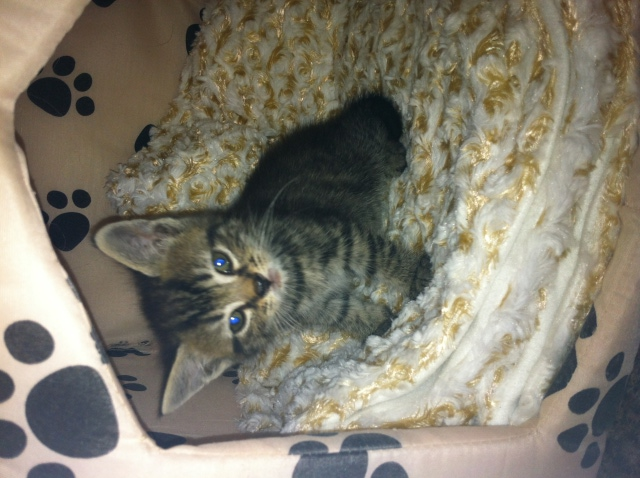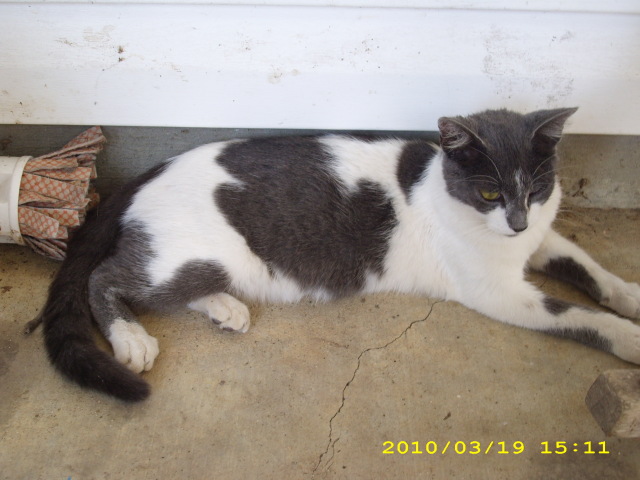QuestionQUESTION: "Hello,
can i put my new adopted kitten (from a shelter) in an outdoor kennel? it will be very spacious and roomy, it will have a cathouse that will protect against extreme hot or cold temps, it will have food, water ,toys, and the kitten will recieve lots of attention. i may also take it out for walks to let it get more exercise. i cannot bring the kitten inside the house due to severe allergies that others' have, but it will be treated the best way possible outside. please help, i really want this kitten.
thanks!"
ANSWER: Hi Marc,
This is not advised. It would be in the best interest of the kitten to return it to the shelter while she's still a baby and most adoptable. Even when we have provided the best insulated shelters, we still have cats who die from extreme hot and cold temperatures every year. Unless there is a garage or basement you can bring the kitty into where temperatures will be below 90 degrees on excessively hot days, and above 40 degrees on cold days, it would be unkind to keep this kitty. Being outdoors 100% of the time is a harsh lifestyle and should only be lived by those who have absolutely no other choice (those cats who are wild). Also, parasitism will be a constant problem unless she is treated with Revolution each month (this is a prescription from the vet). This kitty has a chance to live indoors at least part time, and the most caring choice would be to give her that opportunity.
If those in the house are willing to take Zyrtec, this is how I have coped with my severe cat allergies. Also grooming the cat and vacuuming frequently help immensely, but I understand not everyone will be willing to try these things.
Best wishes!
Jessica
---------- FOLLOW-UP ----------
QUESTION: Thank you so much for your detailed response.
Are there any other medicines similar to Revolution that I can use? (Like maybe, other brands?) And how much does Revolution cost on average?
And you said that treating my cat for fleas should prevent tapeworms, so what exactly is treating a cat for fleas? Is it something that needs to be repeated maybe monthly or yearly?
And how much would the Frontline Plus cost? How often will I need to take my kittens to the vet?
If I am able to provide the kittens with the necessary medications and have a garage for them available, do you think it is okay for me to keep outdoor cats? And in the garage, should I have a temporary cage to keep them in? (I don't want them loose in the garage..it doesn't seem safe to me.)
Thank you so much!!
AnswerThere is no medication similar to Revolution available right now, that would take care of all the parasites mentioned. You would need to treat all of those parasites with separate medications, instead, mostly with different prescription medications, which would require a vet visit.
Revolution is a liquid that's applied to between the shoulder blades once a month at home. It kills and prevents fleas (this is what I meant by "treating for fleas"), and also kills roundworms, kills and prevents ear mites, and prevents heart worm. In my area, vets charge about $18 for each adult cat treatment, and you can buy it without a vet visit, as long as the cat has seen the vet before. Some vets require that the cat be seen yearly to dispense this medication.
Frontline is also a liquid that gets applied between the shoulder blades or on the back of the neck. This does not require a prescription and can be obtained through your vet or an online pet pharmacy. This costs around $10-$12 on average if you get it through an online pet pharmacy.
Cats should see the vet typically at least twice when you first get them for their first series of shots. Then they'll need to be seen again in a year for their booster shots. After that, it will depend on your state laws as to how often they require a rabies vaccine. Because your cat will be an outdoor cat, she is at high risk for distemper, which is an extremely hardy and deadly virus. I would recommend keeping her up-to-date on this vaccine, which should be given yearly. So she should be seen at least yearly. However, she will be more likely to have upper respiratory infections, etc., due to exposure to extreme temperatures, which will tax her immune system. I would expect at least an extra vet visit each year. When she gets older, other health issues, such as dental problems, kidney or thyroid issues could arise. These are all things to think about in the long-run.
As for the cage in the garage, this would be good to prevent the kitties from getting into trouble, such as licking anti-freeze during the winter, if things like this are stored here. But be sure it's of an appropriate size for them. Remember, you'll need to fit litter, food, bedding, etc. in there. Also, remember that the outdoor kennel is going to require all kinds of environment enrichment like scratching posts and climbing structures, cat-safe bushes (non-toxic) and things of that nature. An empty kennel will cause a kitty to have serious behavioral problems. It will be up to you to provide them with as much stimulation as indoor cats would get interacting with a family.

 old cat not eating
Questionmy cat Tootie xo
QUESTION: I have a 19 y
old cat not eating
Questionmy cat Tootie xo
QUESTION: I have a 19 y
 Lost Cat questions
QuestionRusty
QUESTION: Ali,
My new
Lost Cat questions
QuestionRusty
QUESTION: Ali,
My new
 Cat nose
QuestionCat
QUESTION: There is a stray cat in o
Cat nose
QuestionCat
QUESTION: There is a stray cat in o
 Bengal kitten?
Question
Pic Picture
Hello, I was wonderi
Bengal kitten?
Question
Pic Picture
Hello, I was wonderi
 My cat, Spots
QuestionQUESTION: Hi. My cat Spots is a wonderful cat.
My cat, Spots
QuestionQUESTION: Hi. My cat Spots is a wonderful cat.